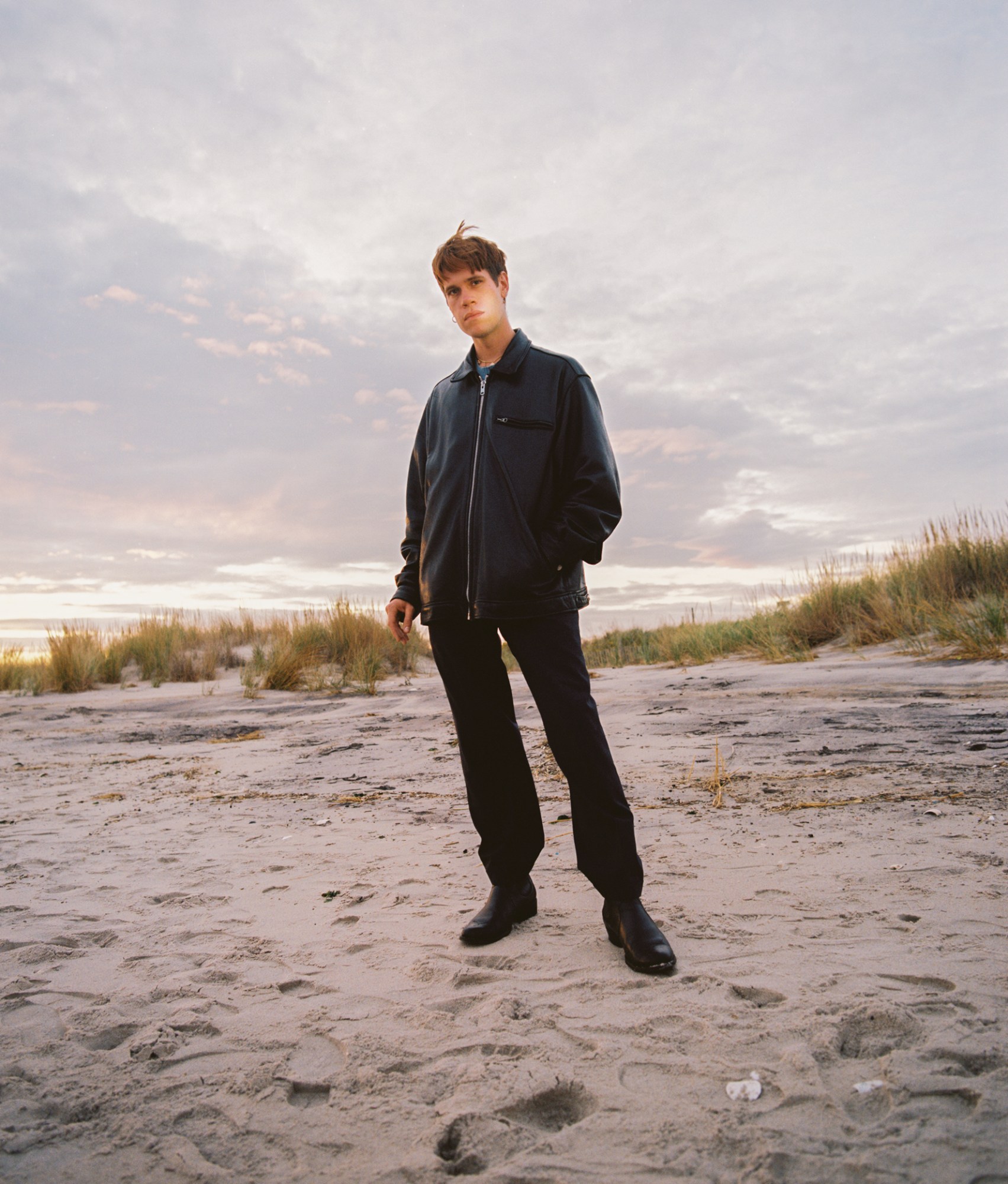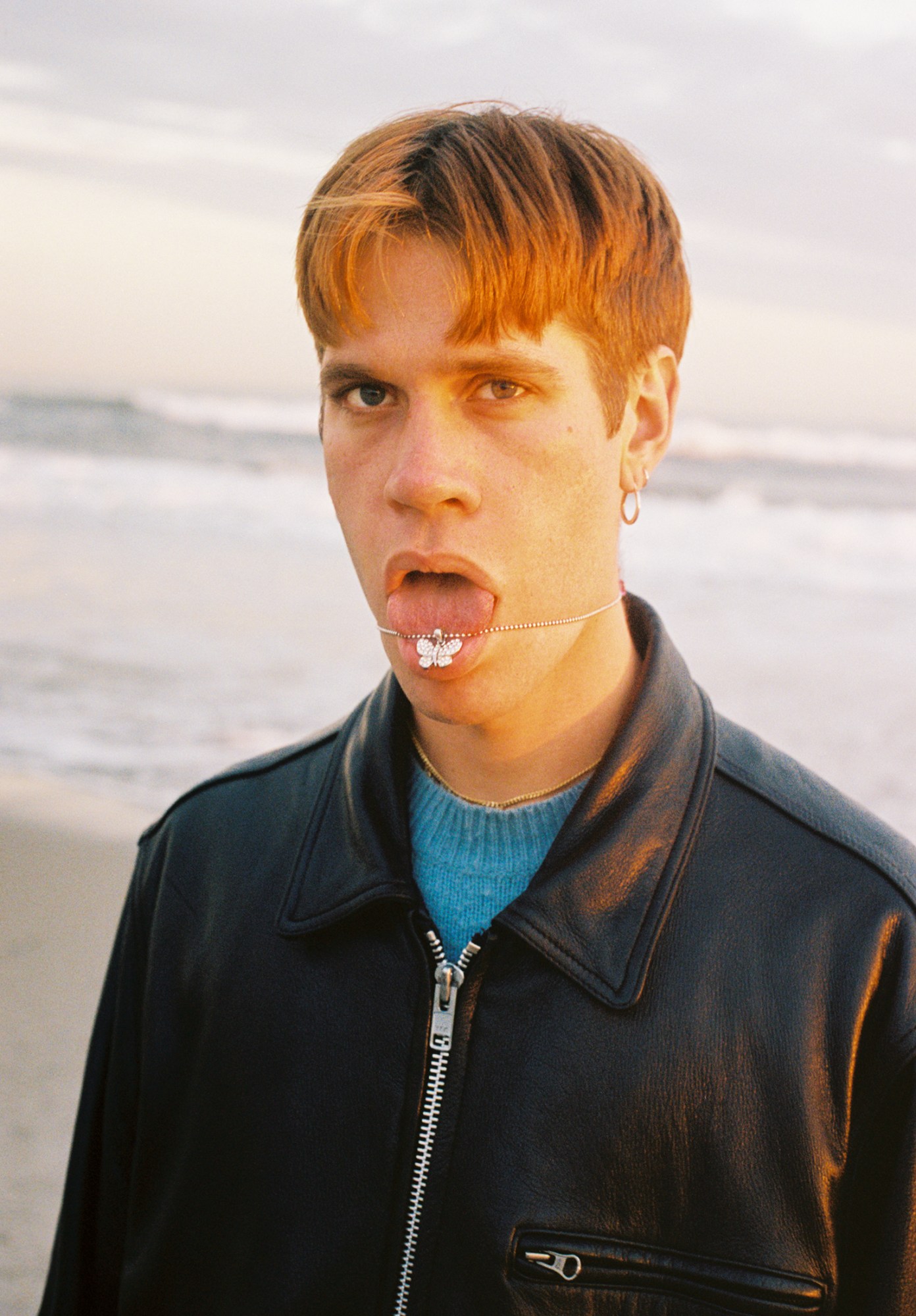In the midst of one of the hottest summers on record, Aaron Maine was hell-bent on changing the name of Porches, the music project that he’s fronted for the last decade. The thought came to him not long after touring his third record The House, which was released in January 2018, when he began reassessing everything about his music career, from his sound to the format of his live shows (he disassembled the band and began performing solo to feel closer to the crowd). Months ago, if you’d asked the now 30-year-old musician what the future might hold for Porches, he probably would’ve said it was the end of an era.
“I had this idea of starting a new chapter,” he says, in between sips of coffee at Metrograph Commissary on the Lower East Side. “I think that’s what it was for me.”
Maine grew up surrounded by music, in the small town of Pleasantville, New York, about 45 minutes north of the city. He started playing guitar and bass in middle school, under the guidance of his father, the singer-songwriter Peter Maine, whose vocals are often featured on Porches’ albums. Throughout his teenage years and early 20s, Maine moonlighted as a number of fleeting musical personas — Aaron Maine, Aaron Maine and the Reilly Brothers, Space Ghost Cowboys, Sex God, Ronald Paris and Ronnie Mystery. But it wasn’t until he released the EP Summer of Ten in 2011, that he became Porches.

As Maine grew up, and began experimenting with different sounds, so did his music. Each release since his fuzzy, indie rock-leaning debut album Slow Dance in the Cosmos (2013), from the warm and welcoming dance tracks of Pool (2016) to the more urgent electronic beats on The House (2018), greatly differs from the last. His abstract, often nonsensical lyrics, act as a guide through his sonic evolution. The first time we met, Maine mentioned that listening to his older songs often feels like reading a cringey old diary entry and he’d do things differently now. As he prepared to release his fourth offering Ricky Music, which came out last week, Maine wanted a fresh start.
“I was writing these songs with that in my mind and I realized that I was the only one that had to come to terms with the name [Porches] and what it meant to me,” Maine explains. “It’s beautiful that it’s this long arc of me growing up, fumbling through life, relationships and ideas… I should just embrace it… I was fed up with something. Myself I guess, more than anyone else. But I’m glad that I came back to it. It just feels right.”
In trying to distance himself from all that is “Porches,” Maine created the most “Porches” record to date — an amalgamation of all of his previous releases that plays to his strengths. At only 26 minutes long, Ricky Music (co-produced by Jacob Portrait) is the artist’s shortest album, but the collection of songs is expansive. It’s a window into a specific moment in time, when he fell in love with Kaya Wilkins (who makes music as Okay Kaya), and then their relationship fell apart — leaving Maine to make sense of it all. Beauty, confusion, loss, longing, anger, joy and sadness, are boldly threaded throughout the 11 tracks.
“I started writing in the throes of being in love, which is exciting and kind of like a whirlwind in hindsight,” Maine recalls. “I think I was out of touch with my reality during a lot of that time. Not in a terrible way, but stuff was happening really fast.”
One of the first tracks that he wrote for Ricky Music is “The Lipstick Song,” which recounts driving to the mall to pick out a gift — a new shade of lipstick for someone — just because. His repetitive lyrics are languorously drawn out along the bassline: “And when you arrived/ gave you a small gift/ I hope that you like/ how it looks on your lips.” It’s the most straight-forward love song on the album, distilling the feeling of being totally swept up in a romantic relationship.
“It’s the idea that everything is like fireworks in your head and you’re spinning — so goofy and annoying. All of your friends are like, ‘What’s wrong with you? Come back to Earth,’” Maine says. “I really like the drama of that song and the celebration of the dumbest or most trivial task.”
Maine played “The Lipstick Song” live for one of the first times last October, at a mostly solo show at The Sultan Room in Brooklyn. He dryly joked that it was about going to the mall and getting Auntie Anne’s pretzels. The same night Maine invited his former bassist Maya Laner (also known as True Blue) up to lend backing vocals on a few tracks, and he and his Dad sang a rendition of Pool’s “Underwater” — the elder Maine cheekily subbing the lyrics “Hi there/ Franklin underwater” for “Hi there/ Aaron Underwater.”

These casual additions to the bill are not unlike the way that Maine invites friends and fellow musicians to collaborate on his records. Though he often holes up alone in his Chinatown apartment, obsessively tweaking lyrics, guitar riffs and beats until they fit — collaboration happens naturally. Ricky Music features Dev Hynes (“rangerover” and “Fuck_3”), Mitski (“Madonna”), Zsela (“Fuck_3”), and Peter Maine (“Wrote Some Songs”). “It feels like a reflection of my reality or who I was seeing in my life at that time. And It’s nice to hear someone else’s voice besides my own,” he says.
Porches records are peppered with bops, like bonus track “rangerover” (in which his semi-autobiographical character Ricky makes an appearance) and the dancey, 80s-inspired song “Do You Wanna.” “It felt like a snappy way to get people’s attention,” Maine explains. “[It’s about] wishing you were feeling a different way or trying to be the ideal version of yourself. And being frustrated because you know that version of yourself, and you’ve seen it before.”
After a few listens, however, what really shimmers are the more intimate, introspective songs like “Hair”, which he describes as a straight break up, heartbreak song. Or those that are so raw, like “Fuck_3,” that he calls on his friends for both vocal and emotional support. The track features a live bass clarinet that Maine likens to the sound of bones breaking. “If you want it, you should have it/ Wish I could have given it to you/ Like it was mine, but it’s not,” he sings.

When Maine puts together his albums, he spends a lot of time working out the sequencing of songs. For The House, this meant 20 or 30 different iterations, and scrapping a number of tracks in the process. For Ricky Music, the order came together pretty naturally. Which is why “Fuck_3” leads right into “Wrote Some Songs,” where Maine talks himself off of an existential cliff, making light of the fact that he’s spent most of his life making music. And reminding himself that that’s okay. “When asked with my life what I’ve done/ I screamed I wrote some fucking songs… Yeah, I did some good, I did some wrong,” he sings offhand. The whole thing is just over a minute long.
The song opens slowly, as Maine delivers his lyrics in monotone, to echo his characteristically deadpan humor in real life. It’s a fairly simple self-reflection on his life’s achievements, boiled down in the most direct way, but Maine pans out as drums come in and synths swell in affirmation. “My Dad screams one line at the end. Like a kid, his voice cracks,” Maine says in his drawn-out whisper, laughing. “We both kind of share that sentiment. But that’s my thing. Making that song is like almost making a joke, but it’s real.”
